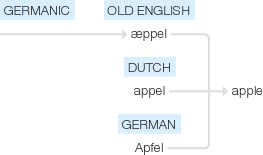Apple
Old English æppel, of Germanic origin; related to Dutch appel and German Apfel .
wiktionary
From Middle English appel, from Old English æppel(“apple, fruit in general, ball”), from Proto-West Germanic *applu, from Proto-Germanic *aplaz(“apple”) (compare Scots aipple, West Frisian apel, Dutch appel, German Apfel, Swedish äpple, Danish æble), from Proto-Indo-European *h₂ébōl, *h₂ébl̥(“apple”) (compare Welsh afal, Irish úll, Lithuanian óbuolỹs, Russian я́блоко(jábloko), possibly Ancient Greek ἄμπελος(ámpelos, “vine”)). [1] [2]
etymonline
apple (n.)
Old English æppel "apple; any kind of fruit; fruit in general," from Proto-Germanic *ap(a)laz (source also of Old Saxon, Old Frisian, Dutch appel, Old Norse eple, Old High German apful, German Apfel), from PIE *ab(e)l- "apple" (source also of Gaulish avallo "fruit;" Old Irish ubull, Lithuanian obuolys, Old Church Slavonic jabloko "apple"), but the exact relation and original sense of these is uncertain (compare melon).
A roted eppel amang þe holen, makeþ rotie þe yzounde. ["Ayenbite of Inwit," 1340]
In Middle English and as late as 17c., it was a generic term for all fruit other than berries but including nuts (such as Old English fingeræppla "dates," literally "finger-apples;" Middle English appel of paradis "banana," c. 1400). Hence its grafting onto the unnamed "fruit of the forbidden tree" in Genesis. Cucumbers, in one Old English work, are eorþæppla, literally "earth-apples" (compare French pomme de terre "potato," literally "earth-apple;" see also melon). French pomme is from Latin pomum "apple; fruit" (see Pomona).
As far as the forbidden fruit is concerned, again, the Quran does not mention it explicitly, but according to traditional commentaries it was not an apple, as believed by Christians and Jews, but wheat. [Seyyed Hossein Nasr, "The Heart of Islam: Enduring Values for Humanity," 2002]
Apple of Discord (c. 1400) was thrown into the wedding of Thetis and Peleus by Eris (goddess of chaos and discord), who had not been invited, and inscribed kallisti "To the Prettiest One." Paris, elected to choose which goddess should have it, gave it to Aphrodite, offending Hera and Athene, with consequences of the Trojan War, etc.
Apple of one's eye (Old English), symbol of what is most cherished, was the pupil, supposed to be a globular solid body. Apple-polisher "one who curries favor" first attested 1928 in student slang. The image in the phrase upset the apple cart "spoil the undertaking" is attested from 1788. Road-apple "horse dropping" is from 1942.
